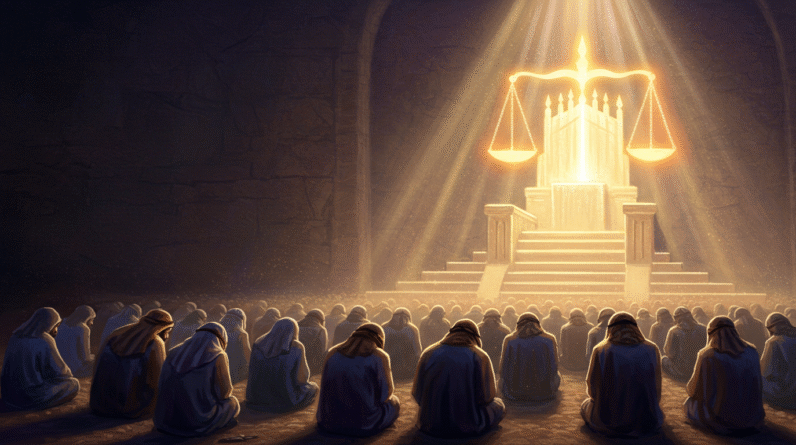God’s Love Through Salvation (John 3:16)
You have seen John 3:16 on posters, heard it quoted from pulpits, and maybe even whispered it in quiet moments of doubt and hope: “For God so loved the world that he gave his one and only Son, that whoever believes in him shall not perish but have eternal life.” John 3:16. That single verse sits at the heart of the Christian message — it speaks plainly to you about God’s love and the way that love meets the reality of human sin and divine justice. In this study, you will walk through how the Bible balances God’s compassion with His righteousness, how salvation answers both, and what that means for your life today.
The Central Promise: What John 3:16 Actually Says
When you read John 3:16, you find a promise, an act, and an invitation. The promise is eternal life; the act is God’s giving of His Son; the invitation is the call to believe. Each element matters because the Bible never presents love as sentiment alone. It presents love as an action that addresses the deeper problem of your brokenness. That deep problem is sin, and the Bible is candid about it: “for all have sinned and fall short of the glory of God.” Romans 3:23. When you pair verses like John 3:16 with those that declare your need, you get the full portrait: God’s love comes to a lost world and provides a way out.
The Problem You Face: Sin and Its Consequences
You cannot understand the meaning of God’s love until you face honestly the problem that love addresses. Scripture says the wages of sin are death — not merely physical death, but spiritual separation from God: “For the wages of sin are death, but the gift of God is eternal life in Christ Jesus our Lord.” Romans 6:23. That isn’t meant to frighten you for fear’s sake, but to wake you up to the seriousness of your condition. From the prophets to the apostles, the consistent testimony is that you need rescue. The prophet Isaiah points to one who would bear our punishment: “But he was pierced for our transgressions, he was crushed for our iniquities; the punishment that brought us peace was on him, and by his wounds we are healed.” Isaiah 53:5. The biblical story is not naïve about human sin; it insists that justice matters.
God’s Justice: Not an Afterthought
You may wonder, if God is loving, why is justice such a major theme? Because love without justice can become sentimentality that ignores moral reality. The Bible presents God as both loving and righteous: “Righteousness and justice are the foundation of your throne; steadfast love and faithfulness go before you.” Psalm 89:14. Deuteronomy reminds you that God’s ways are just and true: “He is the Rock, his works are perfect, and all his ways are just. A faithful God who does no wrong, upright and just is he.” Deuteronomy 32:4. Justice is not opposed to compassion in Scripture; it is its framework. God cannot ignore sin and remain holy; His love must operate within the bounds of His righteous character.
How Love and Justice Meet: The Cross
This is where John 3:16 becomes more than a slogan. God’s love and justice meet at the cross of Jesus Christ. The New Testament tells you plainly that God demonstrates His love by sending Christ to die for sinners: “But God demonstrates his own love for us in this: While we were still sinners, Christ died for us.” Romans 5:8. Jesus’ death is not a late resort or a legal loophole. It is the precisely fitting answer to the problem of sin: the righteous penalty is paid, and yet a way of mercy is opened. The apostle Paul summarizes that exchange by saying, “God made him who had no sin to be sin for us, so that in him we might become the righteousness of God.” 2 Corinthians 5:21.
Why the Cross Is Necessary: The Seriousness of Sin
You might ask, why could God not simply forgive without the cross? The Bible shows that forgiveness does not set aside God’s righteousness. Hebrews makes clear that forgiveness comes through the shedding of blood: “Without the shedding of blood there is no forgiveness.” Hebrews 9:22. The cross upholds divine justice — the consequence of sin has been borne — while manifesting God’s love, because the One who bears it is the Son who willingly gave Himself. In John’s Gospel you see Jesus described as the Lamb of God who takes away the sin of the world: “Behold, the Lamb of God, who takes away the sin of the world!” John 1:29. That image shows you both the seriousness of sin and the depth of God’s love in rescuing you.
The Offer: Faith and Repentance
John 3:16 says, “whoever believes” shall have eternal life. Belief in Scripture means more than intellectual assent; it is trusting your life to Christ. The New Testament places belief alongside repentance — a turning from sin and a turning toward God. Peter’s message calls for this combined response: “Repent and be baptized, every one of you, in the name of Jesus Christ for the forgiveness of your sins.” Acts 2:38. Salvation is a gift you receive by faith: “For it is by grace you have been saved, through faith — and this is not from yourselves, it is the gift of God.” Ephesians 2:8-9. When you respond in repentance and faith, you are not earning salvation; you are accepting the remedy God has provided.
How the Bible Explains Justification
When you trust Christ, the Bible teaches that you are declared righteous before God — this is called justification. Paul explains the heart of the gospel in Romans: “God presented Christ as a sacrifice of atonement, through the shedding of his blood, to be received by faith. He did this to demonstrate his righteousness because in his forbearance he had left the sins committed beforehand unpunished.” Romans 3:25-26. Justification shows you that God remains just and is also the justifier of those who have faith in Jesus. That is a staggering truth: God’s holiness is intact; His love is extended; and you can stand forgiven before Him.
Assurance: Can You Know You Are Saved?
You may worry whether your faith is genuine. Scripture gives you reasons for assurance. Jesus promises eternal life to the one who believes: “Very truly I tell you, whoever hears my word and believes him who sent me has eternal life and will not be judged but has crossed over from death to life.” John 5:24. The apostle John writes about believers having confidence before God: “This is how we know that we live in him and he in us: He has given us of his Spirit.” 1 John 4:13. The presence of the Holy Spirit, the transformation of your desires, a hunger for God’s Word, and the fruits of the Spirit are all evidences that accompany true faith. Assurance is not presumption; it is the calm confidence that comes when you have rested your soul on what Christ has done.
Salvation: Gift and Process
You must understand that salvation is both immediate and progressive. When you surrender your life to Christ, you are instantly forgiven, adopted into God’s family, and given new life: “Therefore, if anyone is in Christ, the new creation has come: The old has gone, the new is here!” 2 Corinthians 5:17. Yet the Bible also speaks of sanctification — the ongoing work of the Spirit conforming you to the image of Christ. Paul prays that you be renewed and strengthened inwardly: “May the God of hope fill you with all joy and peace as you trust in him, so that you may overflow with hope by the power of the Holy Spirit.” Romans 15:13. You are saved from the penalty of sin at conversion, and you are being saved from the power and presence of sin throughout your life.
The Role of Grace and Works
You might worry that the emphasis on grace will make righteousness unnecessary. The New Testament answers firmly: faith without works is dead. James writes plainly, “Faith by itself, if it is not accompanied by action, is dead.” James 2:17. Your good deeds do not earn salvation, but true faith expresses itself in love and obedience. To see how God’s love transforms behavior, look at the call to love your neighbor as yourself — a summary of living faith: “He has shown you, O mortal, what is good. And what does the LORD require of you? To act justly and to love mercy and to walk humbly with your God.” Micah 6:8. Your response to grace should produce a heart for both mercy and justice.

God’s Love in Action: Compassion Without Compromise
You will notice throughout Scripture that God’s compassion never ignores truth. Jesus reached out to the marginalized, forgave sinners, and ate with tax collectors — yet He also called people to repentance. When you follow Christ, you are called to mirror that balance: show mercy to the lost, stand for the oppressed, and speak truth with love. The prophet Isaiah celebrates a God who both forgives and heals: “Surely he took up our pain and bore our suffering… and by his wounds we are healed.” Isaiah 53:4-5. The gospel is not a call to passivity in the face of injustice; it is an impetus for courageous and humble action.
The Mission of the Church: Proclaiming Love and Justice
If you’re part of a local church or a community of believers, your mission is to proclaim God’s mercy and to pursue righteousness. Jesus commanded his followers to make disciples of all nations, baptizing them and teaching them to obey his commands: “Therefore go and make disciples of all nations.” Matthew 28:19. The apostle Paul reminds you that the gospel is the power of God for everyone who believes: “For I am not ashamed of the gospel, because it is the power of God that brings salvation to everyone who believes.” Romans 1:16. As you engage in mission, remember that your witness is both word and deed — announcing God’s mercy and living out His justice.
The Universal Offer and the Personal Choice
John 3:16 is universal in scope — God loved the world. Yet the offer is personal — it is to “whoever believes.” The Bible invites everyone, but it does not force anyone. Revelation describes a final judgment where those who reject God’s mercy face the consequence of their choice. It is sobering: “Anyone whose name was not found written in the book of life was thrown into the lake of fire.” Revelation 20:15. That truth should stir you to urgency, not cruelty. You are called to plead with people to accept the Savior you know, because you understand both the blessing of salvation and the seriousness of rejecting it.
Practical Steps: Responding to God’s Offer
If you feel the pull of God’s love and want to respond, the Bible points you to simple, life-changing steps. They are accessible, truthful, and immediate.
- Acknowledge your need and confess your sin: “If we confess our sins, he is faithful and just and will forgive us our sins.” 1 John 1:9.
- Repent and believe in Jesus: “Repent, then, and turn to God, so that your sins may be wiped out.” Acts 3:19.
- Receive Christ by faith and be baptized as a public sign: “Whoever believes and is baptized will be saved.” Mark 16:16.
These steps are not a formula or magic; they are a posture of the heart before a holy God who loves you.
The Security of the Believer
Once you receive Christ, what keeps you? Jesus himself prayed for the security of his followers and promised that those given to him will not be snatched from his hand: “My Father, who has given them to me, is greater than all; no one can snatch them out of my Father’s hand.” John 10:29. Paul echoes that nothing can separate you from the love of God in Christ Jesus: “For I am convinced that neither death nor life… nor anything else in all creation, will be able to separate us from the love of God that is in Christ Jesus our Lord.” Romans 8:38-39. That security is not an excuse for sin; it is a comfort that frees you to love God and others without fear.
Living Out the Gospel: Love That Seeks Justice
When you have experienced God’s love through salvation, your life will begin to reflect both mercy and justice. The Psalms and prophets often link godly love with pursuit of justice: “Mercy and truth have met together; righteousness and peace have kissed.” Psalm 85:10. As you grow in Christ, you’ll find your compassion prompting you to help the poor, defend the weak, and speak for the voiceless. You will serve not out of obligation but out of gratitude, because the love that saved you has reshaped your heart.
The Church as a Sign of God’s Love and Justice
Your local church should be a living demonstration of John 3:16 — a place where God’s love is preached and His justice practiced. In the early church, believers shared goods, cared for widows, and supported one another: “All the believers were together and had everything in common. They sold property and possessions to give to anyone who had need.” Acts 2:44-45. Such practical faith is the proof of a gospel that transforms hearts. The church must both declare salvation and embody it through acts of mercy and advocacy.
Human Responsibility and Divine Sovereignty
You may wrestle with how human choice fits with God’s sovereign plan. Scripture calls you to respond while also affirming that salvation is God’s work: “For by grace you have been saved through faith. And this is not your own doing; it is the gift of God.” Ephesians 2:8. God initiates; you respond. That tension should lead you to humble urgency: pray for the lost, preach the gospel, and live a life that points others to Christ, trusting God to bring the increase.
The Joy of Knowing You Are Loved
Throughout Scripture you see the repeated invitation to rejoice in God’s steadfast love. The psalmist bursts forth with the certainty of divine care: “Because your love is better than life, my lips will glorify you.” Psalm 63:3. When you grasp John 3:16 in your soul, you find that life takes on new meaning. The Christian faith is not primarily a set of rules; it is a relationship with a loving Savior who died to bring you home. That reality gives you peace in storms and hope in sorrow.
Objections Answered: Common Questions You Might Have
You will have questions — about assurance, about the fairness of God, about other religions. The Bible addresses these concerns gently but firmly. If you wonder about God’s justice, remember that He is both just and the judge who offers mercy: “For he is our God and we are the people of his pasture.” Psalm 95:7. If you worry the gospel is exclusive, understand that Jesus himself said he is the way, the truth, and the life, and no one comes to the Father except through him: “I am the way and the truth and the life. No one comes to the Father except through me.” John 14:6. That statement is not a claim of cruelty but a declaration of the unique means God has provided to reconcile sinners to himself.
The Long View: Eternity and Judgment
God’s love does not erase the reality of final judgment; rather, it offers a way to escape it. Scripture speaks of a future when every knee will bow and every tongue confess that Jesus Christ is Lord: “Every knee should bow… and every tongue acknowledge that Jesus Christ is Lord, to the glory of God the Father.” Philippians 2:10-11. Judgment is real, but the purpose of the gospel is rescue: to bring you into fellowship with God forever. The invitation of John 3:16 remains urgent — the door is open, but it will not remain open forever without your response.
A Personal Word: What It Looks Like to Decide Today
If you are reading this and your heart is stirred, let me speak plainly in the spirit of the gospel: you can come to Christ now. The New Testament urges immediate response to God’s call. Paul’s admonition rings true: “Be reconciled to God.” 2 Corinthians 5:20. You need not wait for a perfect time, for none of us are perfect. The Savior who died for sinners says, “Whoever comes to me I will never drive away.” John 6:37. Pray, ask for forgiveness, trust Jesus, and begin the journey of new life.
Practical Next Steps If You Want to Follow Jesus
If your heart is moved, take practical steps. Find a Bible-reading plan and begin with the Gospels to meet Jesus afresh. Join a local church where you can grow in faith and serve others. Share your decision with someone who can disciple and encourage you. The apostles modeled baptism, discipleship, and fellowship; you are invited into that same pattern. Remember these key passages as guides:
- Confess and believe: “If you declare with your mouth, ‘Jesus is Lord,’ and believe in your heart that God raised him from the dead, you will be saved.” Romans 10:9.
- Live by the Spirit: “Walk by the Spirit, and you will not gratify the desires of the flesh.” Galatians 5:16.
- Practice love and justice: “Do not merely listen to the word, and so deceive yourselves. Do what it says.” James 1:22.
Conclusion: God’s Love Is the Foundation of Justice and Salvation
As you have seen, John 3:16 is not a verse you can understand apart from the rest of Scripture. God’s love through salvation is the grand arc — it does not cancel God’s righteousness, but fulfills it. The cross is where God’s justice and mercy meet, paying the penalty for sin while providing a way of life and hope for you. If you will trust Jesus, you will find more than a rescue plan; you’ll find a relationship with the living God who loves you enough to redeem you.
If your heart is stirred even now, bow before him in prayer, confess your need, and ask Jesus to be your Savior and Lord. The Bible promises that such repentance and faith bring forgiveness, adoption, and eternal life: “To all who received him, to those who believed in his name, he gave the right to become children of God.” John 1:12.
Explore More
For further reading and encouragement, check out these posts:
👉 7 Bible Verses About Faith in Hard Times
👉 Job’s Faith: What We Can Learn From His Trials
👉 How To Trust God When Everything Falls Apart
👉 Why God Allows Suffering – A Biblical Perspective
👉 Faith Over Fear: How To Stand Strong In Uncertain Seasons
👉 How To Encourage Someone Struggling With Their Faith
👉 5 Prayers for Strength When You’re Feeling Weak

📘 Jesus and the Woman Caught in Adultery – Grace and Mercy Over Judgement
A powerful retelling of John 8:1-11. This book brings to life the depth of forgiveness, mercy, and God’s unwavering love.
👉 Check it now on Amazon
As a ClickBank & Amazon Affiliate, I earn from qualifying purchases.
Acknowledgment: All Bible verses referenced in this article were accessed via Bible Gateway (or Bible Hub).
“Want to explore more? Check out our latest post on Why Jesus? and discover the life-changing truth of the Gospel!”








